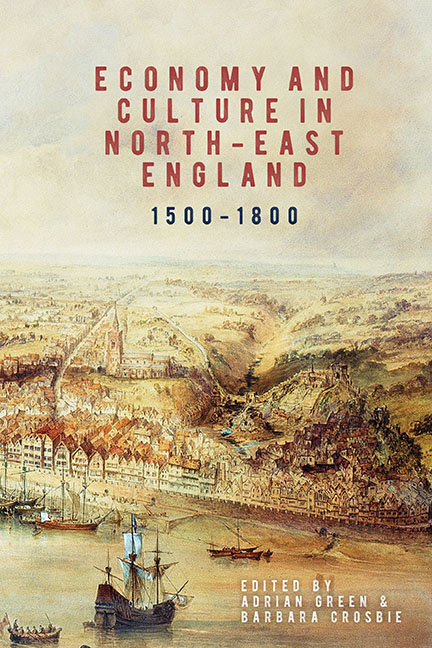Book contents
- Frontmatter
- Contents
- List of Maps, Figures and Tables
- Preface
- Contributors
- Foreword
- List of Abbreviations
- Map
- Introduction: ‘Beyond Coal and Class’: Economy and Culture in North-East England, 1500–1800
- 1 Church Leaseholders on Durham Cathedral's Estate, 1540–1640: The Rise of a Rural Elite?
- 2 Durham Ox: Commercial Agriculture in North-East England, 1600–1800
- 3 Fluctuating Fortunes: The Bowes Family and Lead Mining Concessions, 1550–1720
- 4 Material Matters: Improving Berwick-upon-Tweed's Urban Environment, 1551–1603
- 5 Work before Play: The Occupational Structure of Newcastle upon Tyne, 1600–1710
- 6 Maintaining Moral Integrity: The Cultural and Economic Relationships of Quakers in North-East England, 1653–1700
- 7 Shipping on the Tyne: The Growth and Diversification of Seaborne Trade in the Eighteenth Century
- 8 From Carboniferous Capitalism to Complementary Commerce: Coastal and Overland Trade between North-East England and Scotland, 1580–1750
- 9 Provincial Purveyors of Culture: The Print Trade in Eighteenth- Century Newcastle upon Tyne
- 10 Parish, River, Region and Nation: Networks of Power in Eighteenth-Century Wearside
- Bibliography
- Index
- Volumes Already Published
7 - Shipping on the Tyne: The Growth and Diversification of Seaborne Trade in the Eighteenth Century
Published online by Cambridge University Press: 13 July 2019
- Frontmatter
- Contents
- List of Maps, Figures and Tables
- Preface
- Contributors
- Foreword
- List of Abbreviations
- Map
- Introduction: ‘Beyond Coal and Class’: Economy and Culture in North-East England, 1500–1800
- 1 Church Leaseholders on Durham Cathedral's Estate, 1540–1640: The Rise of a Rural Elite?
- 2 Durham Ox: Commercial Agriculture in North-East England, 1600–1800
- 3 Fluctuating Fortunes: The Bowes Family and Lead Mining Concessions, 1550–1720
- 4 Material Matters: Improving Berwick-upon-Tweed's Urban Environment, 1551–1603
- 5 Work before Play: The Occupational Structure of Newcastle upon Tyne, 1600–1710
- 6 Maintaining Moral Integrity: The Cultural and Economic Relationships of Quakers in North-East England, 1653–1700
- 7 Shipping on the Tyne: The Growth and Diversification of Seaborne Trade in the Eighteenth Century
- 8 From Carboniferous Capitalism to Complementary Commerce: Coastal and Overland Trade between North-East England and Scotland, 1580–1750
- 9 Provincial Purveyors of Culture: The Print Trade in Eighteenth- Century Newcastle upon Tyne
- 10 Parish, River, Region and Nation: Networks of Power in Eighteenth-Century Wearside
- Bibliography
- Index
- Volumes Already Published
Summary
The history of Newcastle upon Tyne and its hinterland has tended to be dominated by the rise and, latterly, the decline of the coal industry. In the seventeenth and eighteenth centuries the local economy of Newcastle upon Tyne was being driven by this thriving industry, which was underpinned by the demand for coal from the rapidly growing metropolis of London, together with markets served by other east coast and foreign ports. By the eighteenth century Newcastle had become a bustling centre of trade and commerce as a consequence of the impact of the burgeoning coal trade upon the economy of the town and its surrounding communities. Unfortunately, this dominance of the coal industry in the local history of Newcastle has often obscured the detail of the economic and social consequences of this economic dynamism, which fostered the development of many other trade and business networks that extended far beyond the coal sector into many aspects of the more general trades of the town. As Newcastle became a flourishing port with a thriving community of merchants and tradesmen, this coal-driven economic momentum involved an expanding population and the development of an urban ‘middling class’. Among this community relative wealth and disposable spending power grew, with increasing expectations of an improved material quality of life fostering the development of a consumer demand for goods. This demand was expressed in terms of both the import of a wider range of more exotic foodstuffs and an increased availability of a wider range of quality soft furnishings and clothing. Newcastle thus participated in the ‘culture of consumption’ that was becoming a pronounced feature of the seventeenth and eighteenth centuries across much of north-western Europe. The consumption of goods has been the subject of extensive analysis by historians, relating the increased demand associated with consumption to the development of markets and altered patterns of sociability within the community. The course of these changes in consumption habits and regional culture in the north-east of England has been lucidly presented in a series of essays edited by Helen Berry and Jeremy Gregory in which a number of distinct features are highlighted, characterised in part by the local industrial and trading community, which was dominated by the coal trade.
- Type
- Chapter
- Information
- Economy and Culture in North-East England, 1500–1800 , pp. 156 - 181Publisher: Boydell & BrewerPrint publication year: 2018

